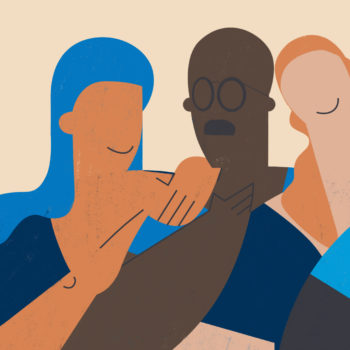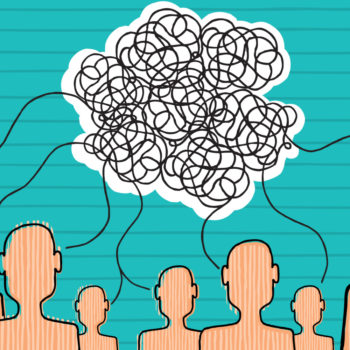5 Ways Funeral Directors Can Help Families When A Death Is Disenfranchised
/ For Funeral Professionals : Litsa
Disenfranchised grief is a term coined by one of our favorite grief researchers, Ken Doka, about twenty years ago. He defines disenfranchised grief as:
“Grief that persons experience when they incur a loss that is not or cannot be openly acknowledged, socially sanctioned or publicly mourned”.
He suggests this can happen for a number of reasons and that most fall into the following categories:
1. The loss isn’t seen as worthy of grief (e.g., non-death losses)
2. The relationship is stigmatized (e.g., partner in an extramarital affair)
3. The mechanism of death is stigmatized (e.g., suicide, overdose, COVID death)
4. The person grieving is not recognized as a griever (e.g., co-workers or ex-partners)
5. The way someone is grieving is stigmatized (e.g., the absence of an outward grief response or extreme grief responses)
A Recent Example: Deaths from COVID-19
Recently, the world has been focused on deaths from COVID-19. And these deaths certainly have the potential to be experienced as disenfranchised.
Notice I say "potential to be experienced as disenfranchised". It's important to note that disenfranchised grief is a subjective experience. People want, need, and receive different things from family, friends, and community. And it's not a guarantee that everyone who experiences a particular type of loss will feel stigmatized or a lack of support and validation.
COVID-19 deaths could be experienced as disenfranchised for a handful of reasons. For example:
- People may blame the deceased for catching COVID or for giving it to others.
- Survivors may feel people are avoiding them out of concern they are contagious or because they remind them of their worst fear.
- Survivors may feel stigmatized by COVID media coverage or believe their loved one has been reduced to a statistic.
It's not a given that someone grieving a COVID death will experience any of these things; however, we've heard of all of these things happening. And all of these things could certainly contribute to feelings of disenfranchised grief.

Other Disenfranchised Losses
As you can imagine, tons of deaths fall into the disenfranchised categories listed above. Some other types of loss that are at high-risk of being disenfranchised are deaths by overdose, suicide, homicide, HIV/AIDS, miscarriage, and stillbirth. Further, there are many other types of disenfranchised loss that go unrecognized, even by professionals. For example, the death of an elderly relative (which people often minimize by saying the person "lived a good, long life"); the death of a family member with a developmental disability; the death of an incarcerated relative; or the death of someone with a severe mental illness.
There's a lot to say about disenfranchised loss. If you want a deeper dive, read our article Understanding Disenfranchised Grief. If you just want examples, check out our 64 Examples of Disenfranchised Grief.
Support Professionals & Disenfranchised Grief
We recently conducted an informal survey with 480 bereaved individuals, and found that 22% of respondents said experiencing stigmatizing comments about their loved one and/or how they died had a negative impact on their grief. Additionally, formal research has shown that family members dealing with these types of disenfranchised losses are more likely to experience social isolation, depression, and suicidal ideation.
It's probably obvious where we're going here: As professionals working with bereaved individuals in the very early days of grief, your care is often a part of what sets the tone for how that person views their loss and the types of support they can expect to receive.
No pressure!
No seriously, please don't feel overwhelmed. You've got this. And, in case you need a little assist, we'll share a few considerations to keep in mind when working with all grieving individuals, but especially those who may be grieving a disenfranchised loss.
5 Considerations for Supporting Potentially Disenfranchised Grief
- Be Mindful of Guilt and Shame. Some of these losses (but certainly not all) can cause family members to feel guilt or shame about the death or the person who died. With things like suicide and overdose, they could feel like they (or their loved one) may be judged by other people. Anything you can do to ensure you are not being judgmental or stigmatizing will go a long way. These losses can feel uncommon because people often do not speak as openly about them. If appropriate, you may want to normalize this for families and assure them that, unfortunately, these losses are not uncommon at all.
- Assume the Family Will Want To Be Honest About the Cause of Death, Unless They Tell You Otherwise. Research shows families are more likely to hide the cause of death when they experience a stigmatized loss. This may be because they assume people will judge their loved one and, possibly, their family. Unfortunately, this can cause further isolation and additional stress because now they need to maintain a lie. By assuming the family is open about the cause of death, you show you believe there is no need to lie, to hide the cause of death, or to be ashamed. If a family indicates other wishes, of course, these should be respected. But even in those instances, you may wind up having a conversation about the implications of each.
- Honor Who the Person Was in Life, Not How They Died. Families often feel a stigmatized cause of death can overshadow the life of a person who died. Spending as much time as you can on who the person was in life can remind the family that the cause death doesn't define who the person was or how they will be remembered. (For example, see You Died of an Overdose; You’re Remembered for a Million Other Things).
- Help Families Think About Their Support System. Normalize that, in grief, there are always going to be people who are especially helpful—and some who will say well-intentioned, but insensitive things. Encourage them to focus on the positive people. Also, give them permission to give feedback to those who say things that are hurtful. Though the latter can be difficult to do, research has shown it helps people improve how they feel about the support they receive.
- Know Your Resources for These Losses. When grieving a stigmatized loss, it can be especially helpful to connect with others with shared experiences. Hopefully, you're already familiar with grief support available in your area. If you haven't already, take a little time to familiarize yourself with local offerings—and make note of any support for people who have experienced potentially disenfranchised losses like homicide, suicide, overdose, and stillbirth. Also, know your online resources in the event you can't find in-person options. What's Your Grief is always a great general option, with over free 500 articles and a podcast on all types of grief! Okay, we might have a slight bias...
A Couple Pro-Tips Around Language:


We invite you to share your experiences, questions, and resource suggestions with the WYG community in the discussion section below.
We wrote a book!
After writing online articles for What’s Your Grief
for over a decade, we finally wrote a tangible,
real-life book!
What’s Your Grief? Lists to Help you Through Any Loss is for people experiencing any type of loss. This book discusses some of the most common grief experiences and breaks down psychological concepts to help you understand your thoughts and emotions. It also shares useful coping tools, and helps the reader reflect on their unique relationship with grief and loss.
You can find What’s Your Grief? Lists to Help you Through Any Loss wherever you buy books:





Cheryl H December 9, 2023 at 8:56 am
My older sister died of pancreatic cancer. At the age of 65. I stayed with her the last five months of her life and took care of her. I was happy and blessed to do it. I saw everything from the beginning to the end my heart is broken, every day I have a breakdown. It will be a year this coming February. I just feel empty. I don’t know how long my body can take being this upset I hide my grief from everyone. I don’t want anyone to see me sad. And that’s hard to do . God bless everyone who’s going through this.
Teri April 28, 2021 at 2:01 am
Also perhaps add ex-spouse? Everyone was sympathetic to our daughters and his new girlfriend of 18 months. Yet we’d been married 18 years, had two daughters and still on great terms. What a void. Everyone seemed to think because we were divorced, I shouldn’t hurt. Very lonely & isolated feeling.
Sandi Packer August 13, 2020 at 9:30 pm
You might want to mention the loss of a pet as well.